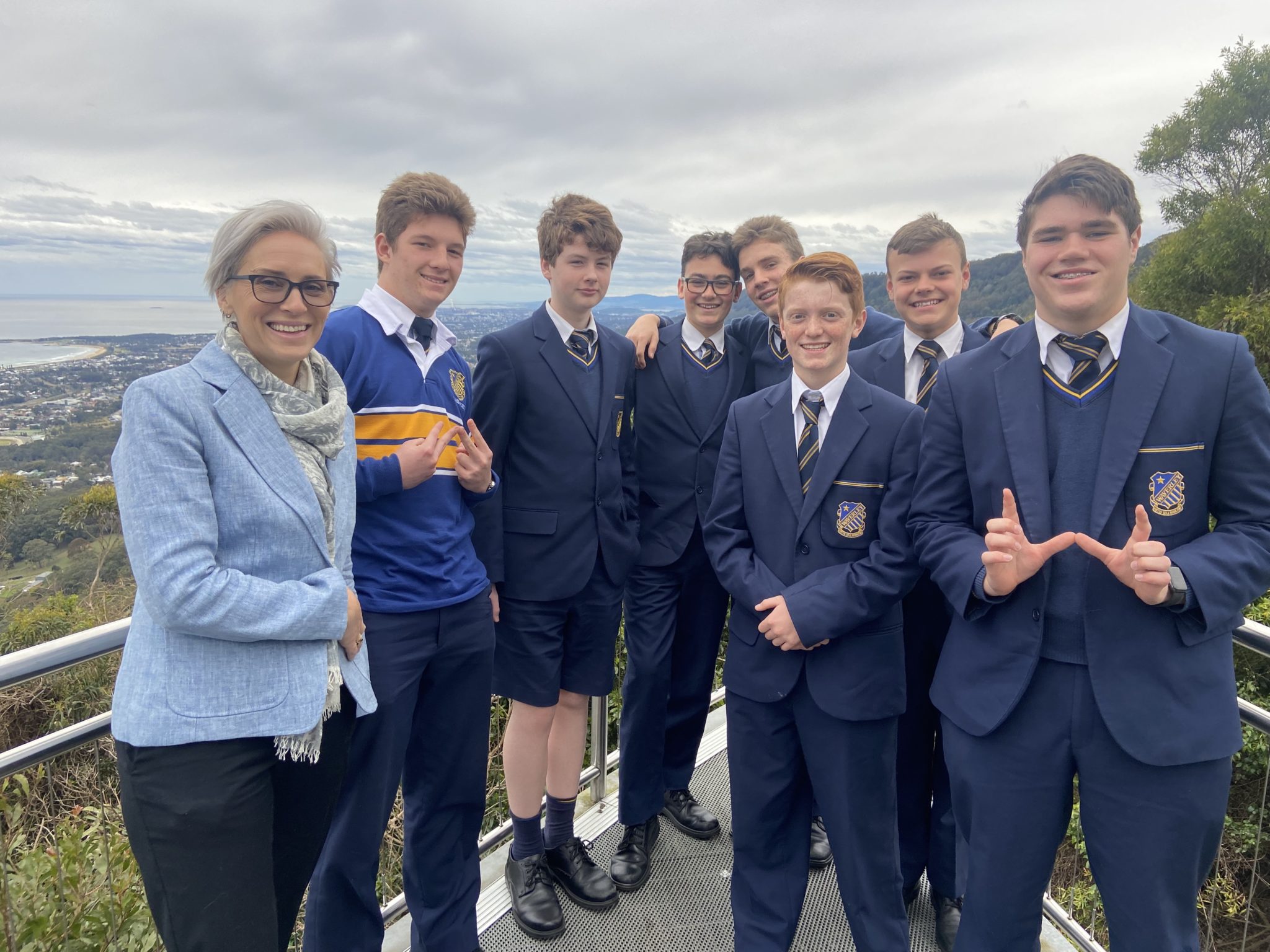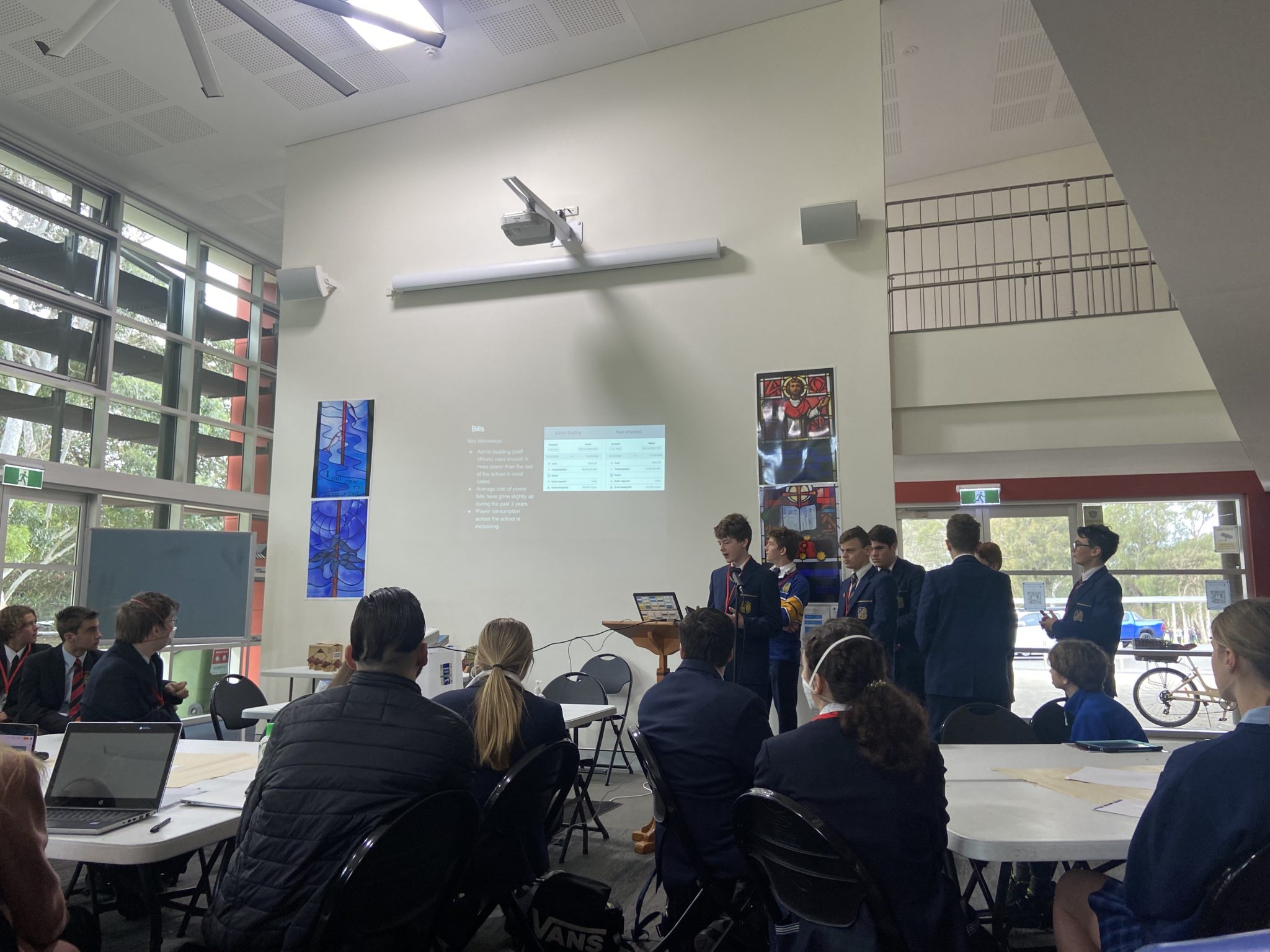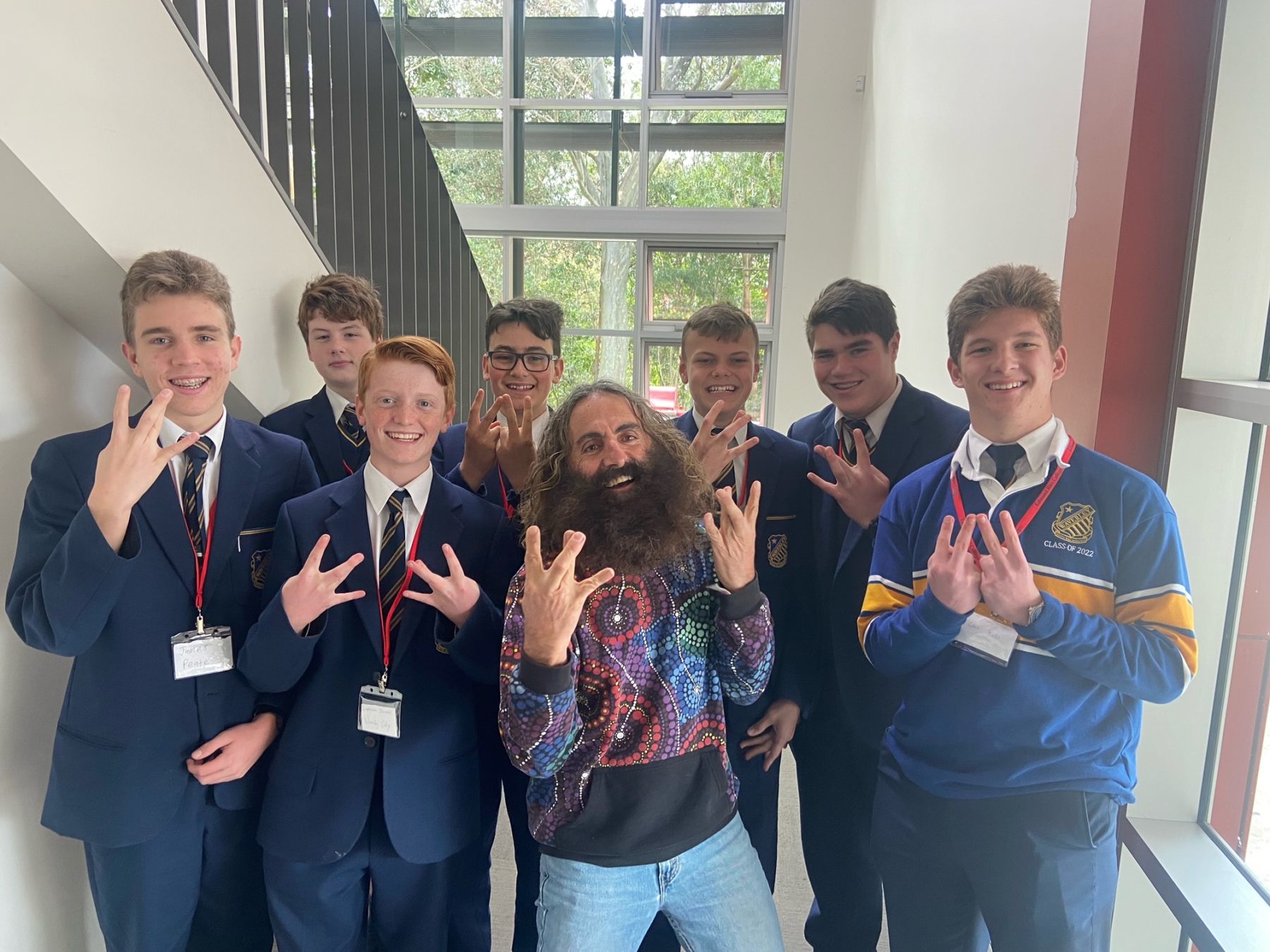On Friday, 19 August, members of the Students of the World Ecology Group attended the annual Eco Edmund Rice College Sustainability Conference at Wollongong. These included myself, Christopher Kallo (Year 12), Liam McEvoy (Year 10), James Peate (Year 9), Max Sheehy (Year 9), Archie Godby (Year 9) and Lachlan Isaac (Year 9).
Lara Pugh and Dr Carl Hopley
The conference began with a presentation by Ms Lara Pugh, from Wollongong City Council who spoke about their sustainable approaches. Following Lara, was Dr Carl Hopley, a Buildings and Facilities Sustainability Planner. One of his projects utilised Bluetooth technology to perfectly illuminate the building only when and where individuals are present. Essentially, the LED lights follow you around by communicating with each other. He also implemented a solar panel scheme, significant enough to hide an Olympic Swimming Pool on the top of one of his projects. These initiatives alone saved $300,000 and absolutely astonishing volumes of energy.
School Presentations
Following these presenters was each school’s presentations on their energy audits and initiatives implemented to address them. We presented a variety of Waverley initiatives as well as our energy audit results, focusing on areas of high-energy consumption within our school. Initiatives that we and others have implemented include, solar panels and solar buddies initiatives, collaboration with St Clare’s, food waste audits and management, green initiatives, and finally, utilising Indigenous plant species in greening projects.
| Results and Initiatives of the Other Schools Presenting | |
| St. Edwards | Implemented the “FLICK” acronym to reduce unnecessary energy consumption, flick the fans off, lights off, computers off and key to lock the door |
| Illawara | Significant costs of energy and to approach sustainability, they implemented a Beeswax Wraps initiative for Year 10 students |
| St. John’s | Discovered that lights, fans and air conditioning were all left on during lunch and times of vacancy, whereby they implemented Johnie’s Action Group and even a beehive to address and reduce this |
| CHBS | Discovered significant energy usage in Music Departments, however sought advice from this conference to address this issue |
| ERC | Discovered that 2019 was an astonishing year in terms of energy consumption and implemented battery recycling and paper recycling |
| St. Mary’s | Discovered that specialist rooms consume more energy than regular classrooms, whereby they instilled ‘No Tech Tuesdays’ where for two periods on a Tuesday, students and teacher plan and complete lessons without the use of technology, with the exception of senior years |
| Lindsey Park | This primary school had incredible young students implementing change through the presentation of their energy consumption and watching other initiatives |
| Holy Spirit | Discovered the impact of leaving, fridges, freezers and microwaves on, every day of the year, and plan to instil more energy-saving initiatives in the future |
Kylie Flament
Kylie Flament then elaborated on the importance of implementing sustainable initiatives through a series of four key assessors: People, Planet, Finance and Capability – supported by the community, good for the planet, financially fundable and achievable. Additionally, Kylie ran a workshop tackling behaviour, whereby each table of students (all from different schools) developed an initiative that they believed could be implemented and was sustainable either in schools or across the community. A quote from Kylie speaks volumes about our society: “Systems are easier to change than the opinions and behaviours of people.”
Sean Staniforth
Following Kylie’s workshop, was an astonishing presentation by an inspiring young entrepreneur and student of Edmund Rice College, Sean Staniforth who discussed the importance of turning your passion into a sustainable and even profitable reality. Sean started his own business known as “Sean’s Unique Woodworking” utilising reused and recycled timber in collaboration with Acacia and PCA Furniture, using their offcuts to produce his sustainable and authentic work. He has every angle of his business covered in terms of sustainable practices, whereby he recycles sawdust and gives wood shavings to his family and friends to utilise in their chicken’s nesting coops.
Costa Georgiadis
Finally, Mr Costa Georgiadis, a Waverley Old Boy, presented an incredibly engaging and active presentation, exemplifying the fact that we should not stand in the way, however provide an alternative to progress towards a solution. He also elaborated that inclusivity is the best policy, we need collaboration and that we need to talk about our failures. The most crucial component Costa wanted to exhibit, was that story comes from the heart. We can let others share our ideas, and we don’t have to force our ides down the throat of others however respond in an open manner, “Well, since you asked..” Costa’s inspiring presentation paved the way to approach our ideas and the best way to have success in doing so.
Final Thoughts
Conclusively, the conference was extremely enjoyable, insightful and enlightening, enabling us to know the best way to approach our solutions, respectfully adapt the behaviours of people, and instil an initiative and achieve an optimal outcome.
I would like to thank Ms Rebecca Sutcliffe and Mr Brad Thompson for their transportation, organisation and incredible guidance during the event. I would also love to thank the younger students in our Ecology Group: Oliver Isaac, Patrick Blackhall and Oliver Lorimer who helped tremendously in preparing our presentation for the event.
By Kayden Baker (Year 9)
Ms Rebecca Sutcliffe
Geography Teacher and Ecology Group Coordinator
E: rsutcliffe@waverley.nsw.edu.au







